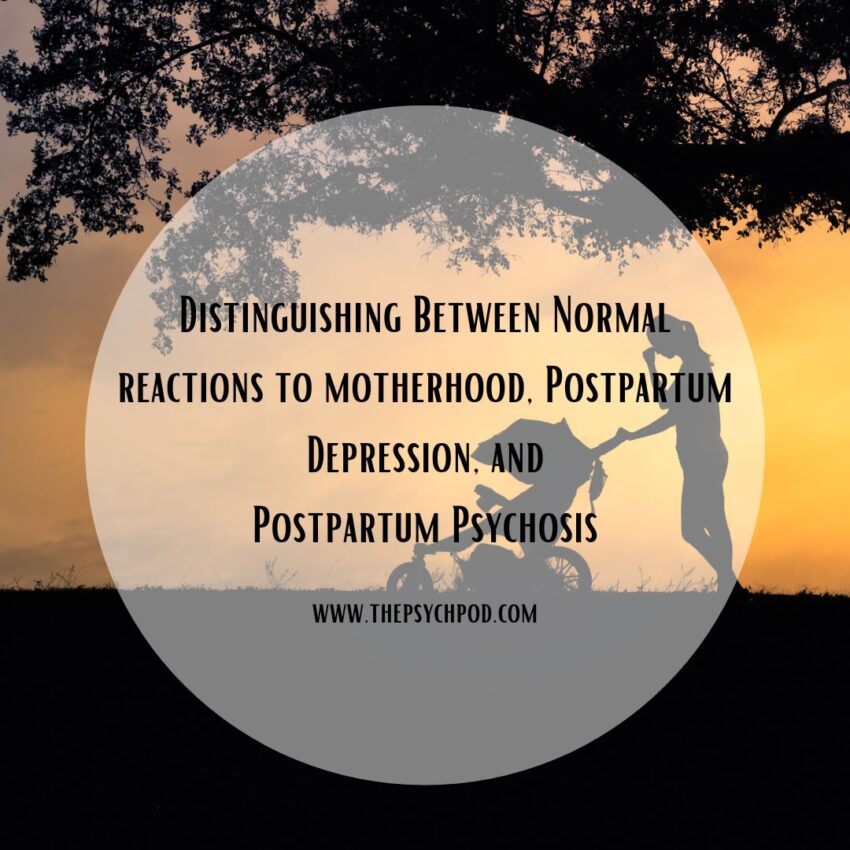Adjusting to new motherhood often involves a range of emotions and experiences some can be positive and others can be challenging. Next, we will help you distinguish between a normal reaction to motherhood and signs of postpartum depression, or postpartum psychosis. Distinguishing between normal reactions and when it may be time to seek help can be crucial for not only your mental health and overall well-being, it is also important for your baby, your partner, and family.
It is estimated that postpartum depression affects about 1 in 7 women globally, though the incidence can vary by country and population. This means that millions of women could be experiencing postpartum depression every year. The wide range in estimates is due in part to differences in how postpartum depression is defined, reported, and measured across different cultures and healthcare systems. It’s also important to note that many cases of postpartum depression may go undiagnosed and unreported, suggesting that the actual numbers could be higher.
What Are Normal Reactions To New Motherhood?
Baby Blues: Feeling emotional or weepy in the first two weeks after childbirth is common, affecting up to 80% of new mothers. These feelings usually peak around the fourth or fifth day and then gradually ease without the need for medical intervention.
Tiredness: Given the demands of caring for a newborn, feeling tired or exhausted is normal.
Worry: New parents often worry about their ability to care for their baby, which is a normal reaction to the increased responsibility.
What Are The Symptoms Of Postpartum Depression ?
Persistent Sadness or Low Mood: Feeling sad, hopeless, or depressed almost daily for more than two weeks.
Lack of Interest or Pleasure: Losing interest in the baby, oneself, or activities that were once enjoyable.
Bonding Difficulties: Having significant trouble bonding with the baby, feeling indifferent, or overly anxious about the baby’s well-being.
Severe Mood Swings: Experiencing severe mood swings, irritability, or anger.
Changes in Appetite or Sleep: Experiencing significant changes in appetite or sleep patterns that are not related to the baby’s schedule.
Thoughts of harm: In severe cases women can begin experiencing thoughts of harming oneself or the baby, or contemplating suicide.
When to Ask for Help:
Symptoms Persist: If the feelings of sadness, anxiety, or other symptoms persist beyond the first two weeks postpartum, it’s crucial to seek help.
Interference with Daily Life: When symptoms start to interfere with your ability to care for your baby, yourself, or perform daily tasks, it’s important to consult a healthcare provider.
Distressing Thoughts: If you have thoughts of harming yourself or your baby, seek help immediately. This is a sign of severe postpartum depression or postpartum psychosis, which requires urgent care.
Alleviating Symptoms Of Postpartum Depression Involves A Combination Of Strategies:
Seek Professional Help: Consulting with a healthcare provider is crucial. They may recommend therapy, such as cognitive behavioral therapy (CBT) or counseling, and in some cases, antidepressant medication.
Support Groups: Joining a support group can provide emotional support and coping strategies from others who have gone through similar experiences.
Self-care: Prioritizing rest, nutrition, and physical activity can improve mood and energy levels. It’s important for new mothers to take time for themselves and engage in activities they enjoy.
Social Support: Leaning on partners, family, and friends for help with the baby and household tasks can lessen the load on the new mother, providing her with time to rest and recover.
Set Realistic Expectations: Understanding that motherhood is challenging and that it’s okay not to be perfect can help mitigate feelings of guilt and inadequacy.
It’s important for those suffering from postpartum depression to remember they are not alone and that help is available. Early intervention can significantly improve outcomes for both the mother and the baby.
Seeking help for postpartum depression involves reaching out to a healthcare provider, such as an OB/GYN, primary care doctor, or a mental health professional, who can offer support, resources, and treatment options tailored to your situation. Remember, asking for help is a sign of strength, and treatment is effective for the vast majority of women.
What About Postpartum Psychosis?
Postpartum Psychosis is a rare but serious mental health condition that can affect new mothers, typically developing within the first two weeks after childbirth. It is much less common than postpartum depression, affecting approximately 1 to 2 out of every 1,000 deliveries. The condition requires immediate medical attention due to the severe risk it poses to both the mother and the baby.
What Are The Symptoms Of Postpartum Psychosis ?
Hallucinations: Seeing or hearing things that aren’t there.
Delusions: Having strong beliefs that aren’t based in reality, often involving the baby.
Extreme Confusion: Being unable to think clearly or make sense of reality.
Mood Swings: Experiencing drastic changes in mood, from high (mania) to low (depression).
Paranoia: Feeling extremely suspicious or fearful without reason.
Attempts to Harm Oneself or the Baby: Having thoughts of or engaging in actions to cause harm.
When to Ask for Help:
Postpartum psychosis is considered a medical emergency. If you or someone you know is showing signs of postpartum psychosis, it’s critical to seek help immediately. The safety of both the mother and the baby is the utmost priority.
Treatment often involves a combination of medication, such as antipsychotics, mood stabilizers, and, in some cases, antidepressants.
Hospitalization is usually necessary to ensure safety and to provide comprehensive care. Psychotherapy may also be beneficial as part of the treatment plan and recovery process.
Understanding the distinction between normal reactions to new motherhood, postpartum depression, and postpartum psychosis is crucial, as the latter requires immediate intervention. With prompt and effective treatment, full recovery from postpartum depression and postpartum psychosis is possible, allowing mothers to safely care for their children and resume their lives.
Dr. Velmi, Psy.D.
